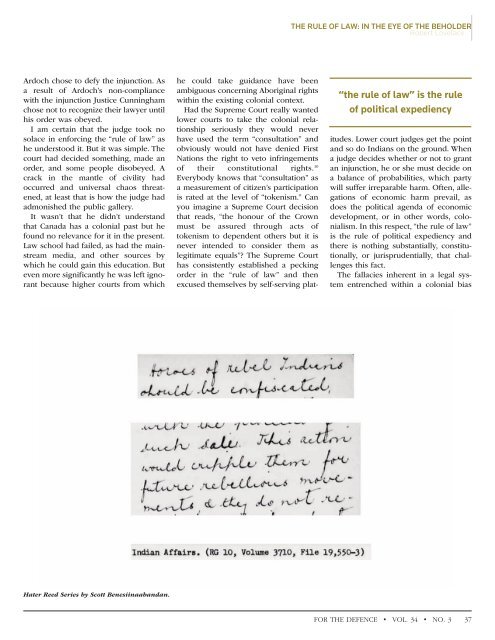FTD_Vol34_No3_web
FTD_Vol34_No3_web
FTD_Vol34_No3_web
Create successful ePaper yourself
Turn your PDF publications into a flip-book with our unique Google optimized e-Paper software.
For the Defence_34-3_Layout 1 13-08-16 10:41 AM Page 37<br />
THE RULE OF LAW: IN THE EYE OF THE BEHOLDER<br />
Ardoch chose to defy the injunction. As<br />
a result of Ardoch’s non-compliance<br />
with the injunction Justice Cunningham<br />
chose not to recognize their lawyer until<br />
his order was obeyed.<br />
I am certain that the judge took no<br />
solace in enforcing the “rule of law” as<br />
he understood it. But it was simple. The<br />
court had decided something, made an<br />
order, and some people disobeyed. A<br />
crack in the mantle of civility had<br />
occurred and universal chaos threatened,<br />
at least that is how the judge had<br />
admonished the public gallery.<br />
It wasn’t that he didn’t understand<br />
that Canada has a colonial past but he<br />
found no relevance for it in the present.<br />
Law school had failed, as had the mainstream<br />
media, and other sources by<br />
which he could gain this education. But<br />
even more significantly he was left ignorant<br />
because higher courts from which<br />
“the rule of law” is the rule<br />
of political expediency<br />
he could take guidance have been<br />
ambiguous concerning Aboriginal rights<br />
within the existing colonial context.<br />
Had the Supreme Court really wanted<br />
lower courts to take the colonial relationship<br />
seriously they would never<br />
have used the term “consultation” and<br />
obviously would not have denied First<br />
Nations the right to veto infringements<br />
of their constitutional rights. 10<br />
Everybody knows that “consultation” as<br />
a measurement of citizen’s participation<br />
is rated at the level of “tokenism.” Can<br />
you imagine a Supreme Court decision<br />
that reads, “the honour of the Crown<br />
must be assured through acts of<br />
tokenism to dependent others but it is<br />
never intended to consider them as<br />
legitimate equals”? The Supreme Court<br />
has consistently established a pecking<br />
order in the “rule of law” and then<br />
excused themselves by self-serving platitudes.<br />
Lower court judges get the point<br />
and so do Indians on the ground. When<br />
a judge decides whether or not to grant<br />
an injunction, he or she must decide on<br />
a balance of probabilities, which party<br />
will suffer irreparable harm. Often, allegations<br />
of economic harm prevail, as<br />
does the political agenda of economic<br />
development, or in other words, colonialism.<br />
In this respect, “the rule of law”<br />
is the rule of political expediency and<br />
there is nothing substantially, constitutionally,<br />
or jurisprudentially, that challenges<br />
this fact.<br />
The fallacies inherent in a legal system<br />
entrenched within a colonial bias<br />
Hater Reed Series by Scott Benesiinaabandan.<br />
FOR THE DEFENCE • VOL. 34 • NO. 3<br />
37



